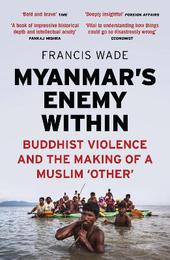
|
Myanmar's Enemy Within: Buddhist Violence and the Making of a Muslim 'Other'
Paperback / softback
Main Details
| Title |
Myanmar's Enemy Within: Buddhist Violence and the Making of a Muslim 'Other'
|
| Authors and Contributors |
By (author) Francis Wade
|
| Series | Asian Arguments |
|---|
| Physical Properties |
| Format:Paperback / softback | | Pages:456 | | Dimensions(mm): Height 198,Width 129 |
|
| Category/Genre | Reportage and collected journalism |
|---|
| ISBN/Barcode |
9781786995773
|
| Classifications | Dewey:322.109591 |
|---|
| Audience | | Professional & Vocational | |
|---|
| Edition |
2nd edition
|
| Illustrations |
1 bw map
|
|
Publishing Details |
| Publisher |
Bloomsbury Publishing PLC
|
| Imprint |
Zed Books Ltd
|
| Publication Date |
15 June 2019 |
| Publication Country |
United Kingdom
|
Description
In 2017, Myanmar's military launched a campaign of violence against the Rohingya minority that UN experts later said amounted to a genocide. More than seven hundred thousand civilians fled to Bangladesh in what became the most concentrated flight of refugees since the Rwanda genocide of 1994. The warning signs of impending catastrophe that had built over years were downplayed by Western backers of the political transition, and only when the exodus began did the world finally come to acknowledge a catastrophe that had been long in the making. In this updated edition of the book that foreshadowed a genocide, Francis Wade explores how the manipulation of identities by an anxious ruling elite laid the foundations for mass violence. It asks: who gets to define a nation? How can democratic rights be weaponised against a minority? And why, at a time when the majority of citizens in Myanmar had begun to experience freedoms unseen for half a century, did much-lauded civilian leaders like Aung San Suu Kyi become complicit in the most heinous of crimes?
Author Biography
Francis Wade is a journalist specialising in Myanmar and Southeast Asia. He began reporting on Myanmar in 2009 with the exiled Democratic Voice of Burma news organisation, based in Northern Thailand, before going on to cover in-depth the transition from military rule and the violence that accompanied it. He has reported from across South and Southeast Asia for The Guardian, TIME, Foreign Policy Magazine, and others. He is now based in London.
ReviewsA sober account of ethnic mistrust and communal violence in Myanmar.' * Australian Foreign Affairs * The strength of Myanmar's enemy within lies in Wade's attempt to understand and explain the complex ways in which discrimination has been perpetuated and entrenched, by looking at the human experience-on all sides-of this ongoing situation ... excellent starting-points for those wanting to understand more about the situation of the Rohingya in Myanmar.' * International Affairs * A lucid and admirable attempt to come to terms with a deeply complicated country. * TLS * Lucid ... exceptionally timely ... vital to understanding how things could go so disastrously wrong. Wade predicted the miserable fate of Myanmar's hated Muslim minority. * Economist * This is a deeply insightful work on the dynamics of ethnic violence. * Foreign Affairs * As Francis Wade's excellent new book shows, this disaster was easily predictable and, with a bit of forethought, could have easily been prevented. * Literary Review * Dotted with anecdotal recollections, the book brilliantly captures how individual lives are shaped, reshaped and irrevocably damaged due to a real or acquired membership within a certain group ... an important work informing debates in these troubled times. * Tea Circle * Bold and brave ... Wade's book tells the personal stories of Muslim and Buddhist characters who have animated the tragic scenes of Myanmar's deadly morality play. * TIME Magazine * Francis Wade has invested immense energy in pursuit of the truth about the tragedy of Myanmar and its Muslim population. There is no other writer on this topic with the same moral courage and intellectual insight. His work demands serious attention. * Fergal Keane, BBC Correspondent and author of Road of Bones: The Epic Siege of Kohima * Essential for all who wish to understand the ethnic cleansing that today threatens Myanmar's Rohingya population and, with it, Myanmar's tenuous path to democracy. Historically deep, balanced, large-spirited, and adorned with vivid and enlightening vignettes. * James C. Scott, Yale University, author of The Art of Not Being Governed: An Anarchist History of Upland Southeast Asia. * Elegantly written, empirically rich, and analytically nuanced, the book combines in-depth, on-the-ground reportage with a solid command of the scholarship. An excellent book. * John T. Sidel, LSE, and author of Riots, Pogroms, Jihad: Religious Violence in Indonesia * [Wade's] razor-sharp attention to narrative ... succeeds, with remarkable nuance and precision, at bringing the country's intricate history into the present. * Los Angeles Review of Books * A fine, engrossing work, at the centre of which is that all too common enmity and conflict between people of different religious and ethnic adherences. * Paul Brass, author of The Production of Hindu-Muslim Violence in Contemporary India * This gripping investigation into the plight of Myanmar's Muslim community reads like a forensic case history, uncovering the full extent of a nation's festering wound. Lucid, compassionate, admirably researched and reasoned, here is scholarly reportage at its best. * Wendy Law-Yone, author of Golden Parasol: A Daughter's Memoir Of Burma * A book of impressive historical depth and intellectual acuity. Francis Wade shatters many cliches about religious violence as he explores its tangled roots in Buddhist Myanmar. * Pankaj Mishra, author of Age of Anger: A History of the Present *
|